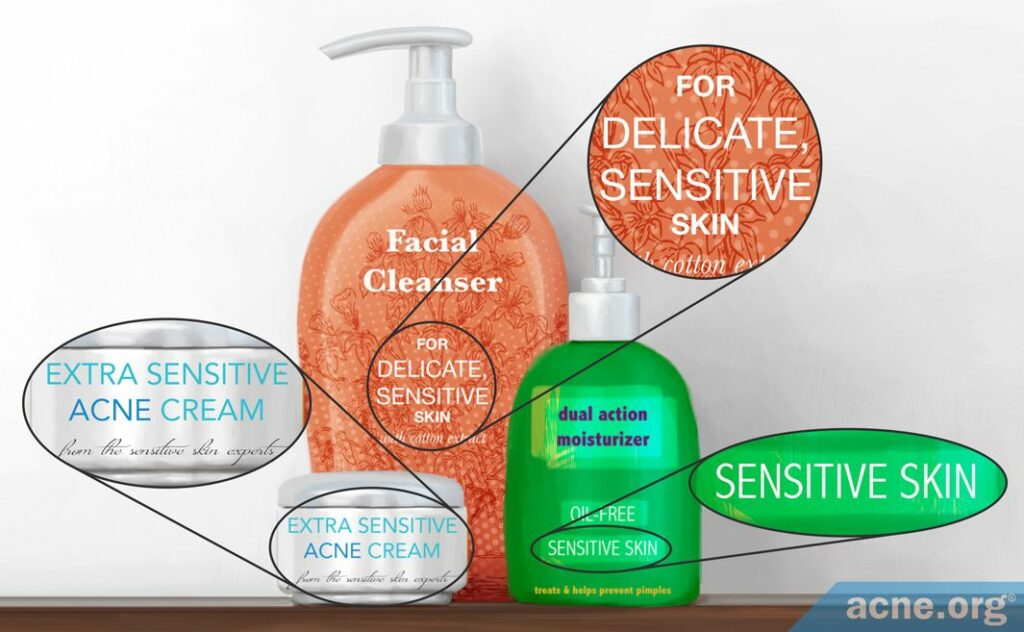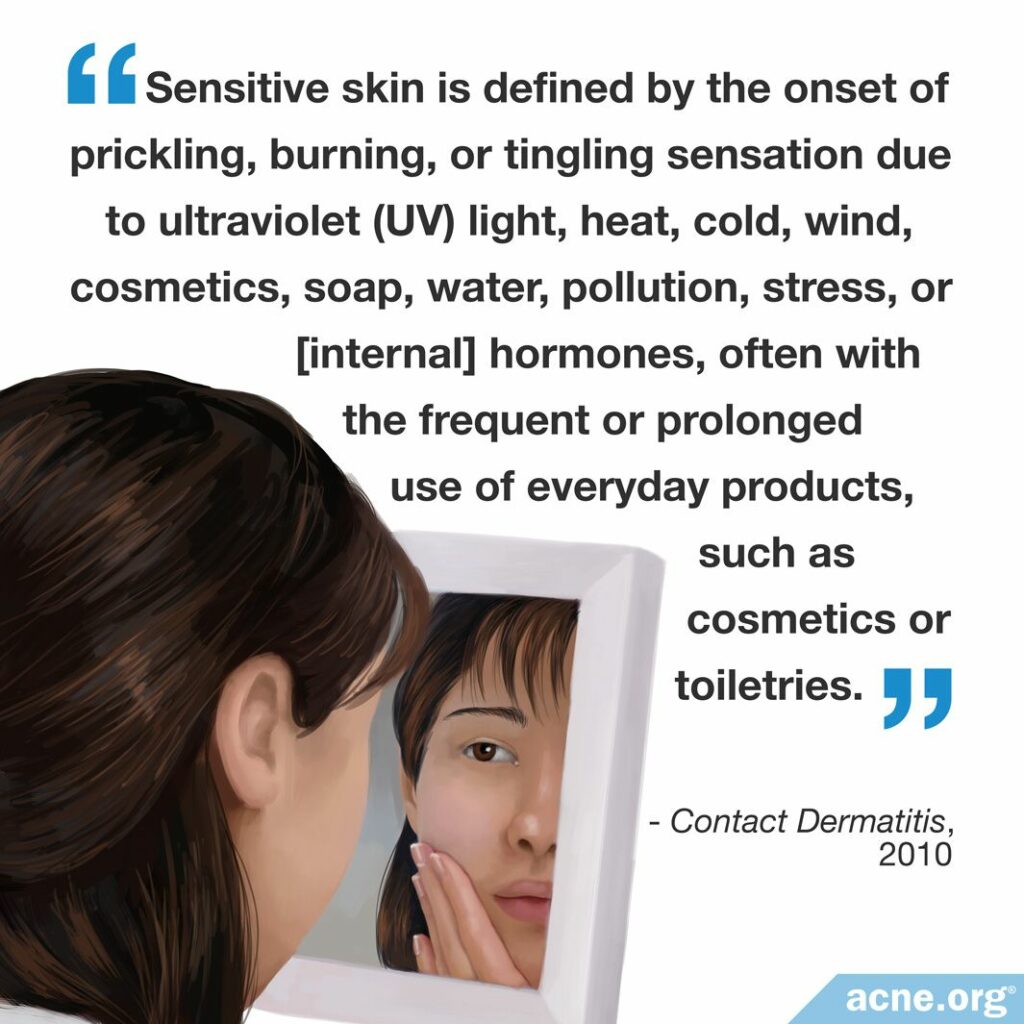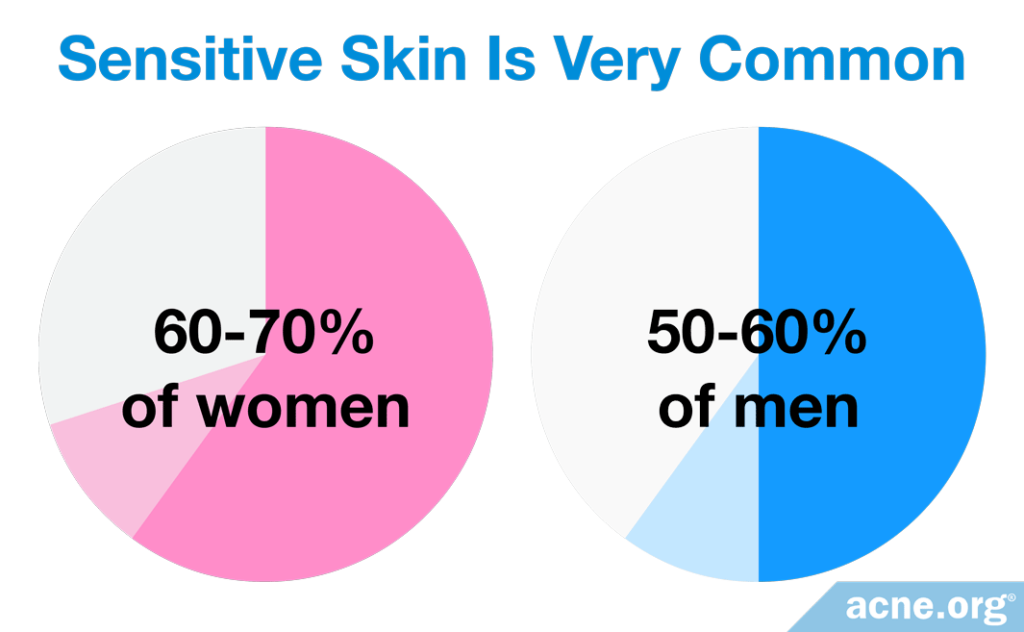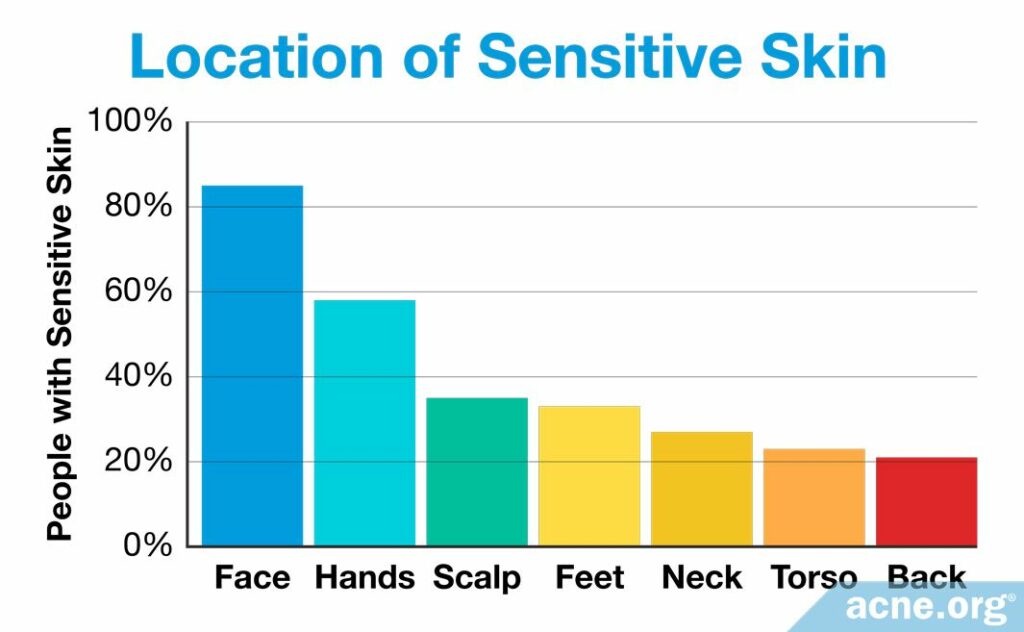Sensitive Skin Is Defined by Burning, Itching, and Skin Irritation in Response to Skin Care Products/Cosmetics or Environmental Conditions. The Best Thing to Do Is Learn Your Triggers and Avoid Them.

The Essential Info
Sensitive skin has no official medical definition, but it is generally accepted that a person has sensitive skin if he/she comes into contact with certain skincare products/cosmetics or conditions like wind, cold, and pollution, and the skin reacts with:
- Itching
- Burning
- Stinging
- Tightness
- Redness
Over 50% of people report having sensitive skin, which is a strikingly high percentage. However, because most of the symptoms are subjective and impossible to measure, some doctors consider sensitive skin to be over-diagnosed, or even a myth.
Biological factors that may contribute to sensitive skin include:
- A weakened skin barrier (top layer of skin)
- Abnormal inflammation in the skin
- An exaggerated nerve response
Things that may make sensitive skin more likely include:
- Female gender – only slightly
- Young age – response to irritants decreases with age
- Fair skin
- Asian background – research is conflicting, but some studies show this
- Cold or humid weather
- Skin allergies – people with skin allergies are more likely to have sensitive skin
Sensitive skin shows up of the body, in order from most common to least common:
- Face
- Hands
- Scalp
- Feet
- Neck
- Torso
- Back
If you believe your skin is sensitive, visit a dermatologist to rule out underlying conditions like rosacea or atopic dermatitis (eczema). Then, use trial-and-error to learn what products or ingredients trigger sensitivity for you and avoid them in the future. Keep in mind that the label “for sensitive skin” on cosmetic products may just be a marketing strategy.

The Science
- Symptoms of Sensitive Skin
- Why the Product Label “For Sensitive Skin” Doesn’t Mean Much
- What to Do If You Have Sensitive Skin
- What Causes Sensitive Skin?
- How Common Is Sensitive Skin?
- Who Is More Prone to Sensitive Skin?
- Where on the Body Does Sensitive Skin Occur?
- The Bottom Line
Today, many skin care products and cosmetics on the market sport the label “for sensitive skin.” Many people also report that their skin is sensitive. But what exactly is sensitive skin, and how do you know if you have it?

The fact is, there is no exact definition of what it means to have sensitive skin. The reason sensitive skin is so hard to define is that it often has no visible outward signs and relies on people’s own reports.
Because there are no obvious features to measure or test, scientists have trouble conducting reliable studies of sensitive skin. For this reason, some doctors consider sensitive skin to be over-diagnosed, and some think it may even be a myth.
To add to the controversy, many manufacturers label products “for sensitive skin” as a marketing gimmick. The wide range of products for sensitive skin makes more consumers believe they possess sensitive skin, which in turn leads doctors to regard the term even more skeptically.
Still, most dermatologists believe that sensitive skin is a real condition. It presents as prickling, burning, or tingling after application of cosmetic products to the skin or after exposure of the skin to a variety of environmental irritants.
A 2010 article in the medical journal Contact Dermatitis defines it this way:

“Sensitive skin is defined by the onset of prickling, burning, or tingling sensation due to ultraviolet (UV) light, heat, cold, wind, soap, water, pollution, stress or [internal] hormones, often with the frequent or prolonged use of everyday products, such as cosmetics or toiletries.”1
In a more recent article published in the journal Acta Dermato-Venereologica, the International Forum for the Study of Itch defined sensitive skin as follows:

“A syndrome defined by the occurrence of unpleasant sensations (stinging, burning, pain, [itching], and tingling sensations) in response to stimuli that normally should not provoke such sensations. These unpleasant sensations cannot be explained by lesions attributable to any skin disease. The skin can appear normal or be accompanied by [redness]. Sensitive skin can affect all body locations, especially the face.”2

Let’s look at the symptoms you need to experience to consider your skin sensitive.
Symptoms of Sensitive Skin
People with sensitive skin report experiencing multiple symptoms, which include:
- Itching
- Burning
- Stinging
- Skin tightness
- Skin redness1
As you can see, most of the symptoms of sensitive skin are subjective, meaning they cannot be directly measured but only described by the patient.
Why the Product Label “For Sensitive Skin” Doesn’t Mean Much
Different people give very different subjective estimates of how irritating a given substance is to their skin, and this makes it difficult to determine what ingredients are suitable for sensitive skin. As a result, the label “for sensitive skin” on skin care/cosmetic products is not necessarily based on sound science, and instead is often just a marketing strategy. In fact, most skin care products and cosmetics, whether labeled “for sensitive skin” or not, are free from known ingredients that will cause itching, burning, stinging, tightness, or redness. After all, if a product contained ingredients known to cause discomfort, consumers would learn to avoid it pretty quickly!
What to Do If You Have Sensitive Skin
Unfortunately, there is no known treatment for sensitive skin. Here are some things you can try if you believe you have sensitive skin:
- See a dermatologist to rule out other skin conditions: The symptoms of sensitive skin can also occur as a result of skin conditions like rosacea or atopic dermatitis (eczema). See a dermatologist to rule out these conditions, which may require specific treatment.
- Get tested for irritants: Your dermatologist can test your skin to see how it reacts to potentially irritating skin care/cosmetic ingredients. Avoiding those ingredients in the future is the best way to prevent symptom flare-ups.
- Moisturize: In some cases, moisturizing the skin daily may provide some relief for sensitive skin. This is because, as we will see below, one possibility is that sensitive skin results from the skin losing too much water. However, depending on the cause of sensitive skin, moisturizing may not necessarily improve the condition.
- Give products for sensitive skin a try: Some skin care/cosmetic products labeled “for sensitive skin” really are formulated carefully to be gentle, but keep in mind that the label may be just a marketing gimmick. In other words, trust your own skin’s reaction more than the product label.
What Causes Sensitive Skin?
Dermatologists do not know exactly what causes sensitive skin, which is what makes the condition so difficult to treat. There are currently three hypotheses (educated guesses) about the causes of sensitive skin:

- An impaired skin barrier: The skin barrier is the outermost layer of the skin, which protects the skin from drying out and also keeps harmful chemicals out. If the lipids (oils) that coat the skin surface and help form the skin barrier become unbalanced, the skin barrier can weaken. With an impaired skin barrier, the skin loses water and the skin surface becomes dry. At the same time, a thinner skin barrier allows chemicals to get inside the skin more easily, increasing the likelihood of irritation. This might also explain why sensitive skin reacts with redness to certain substances: if chemicals are able to penetrate the skin more readily, these chemicals may cause blood vessels underneath the skin to expand, causing redness. In other words, people who have sensitive skin might simply have an impaired skin barrier.
- Abnormal inflammation in the skin: Inflammation is the body’s reaction to an injury or infection. It may be that in people with sensitive skin, relatively harmless substances trigger an abnormal inflammatory reaction in the skin, causing symptoms such as itching, burning, and redness. In other words, people with sensitive skin may have a healthy skin barrier but an overactive inflammatory response.
- Exaggerated nerve response: The skin contains nerve endings that allow us to feel touch, heat, cold, and pain. It may be that in sensitive skin, these nerve endings are hypersensitive, causing people to perceive slight irritation more intensely. For example, for a person with hypersensitive nerve endings, a slight drop in skin temperature might feel like the skin is freezing.1,4-6
How Common Is Sensitive Skin?
Sensitive skin appears to be very common. Different studies estimate the incidence of sensitive skin to range somewhere between 50% and 90%.
The largest study ever performed looked at 15,000 people in the USA, Japan, and Europe in 1992. The researchers found that 50% of women and 30% of men who participated in the study reported sensitive skin. Other studies around the world have come up with different estimates, but on average, they find that 65% of women and 54% of men claim to have sensitive skin.

In a 2019 article in the journal Frontiers in Medicine, researchers reviewed evidence collected over the last two decades from over 20 different countries. In line with other estimates, they wrote, “Overall, ~60 – 70% of women and 50 – 60% of men report having some degree of sensitive skin.”3


However, all these studies rely on people’s own reports of their sensitivity, making the results inherently subjective.1,7 When researchers actually apply various chemical irritants to people’s skin and look for objective signs of skin irritation, they find that only 14% of people possess sensitive skin.1 However, as we discussed, the fact that sensitive skin may not be outwardly visible does not necessarily mean the symptoms people report are not real.
In addition, a person’s race may affect how sensitive skin manifests for him or her. For example, Caucasians seem to develop more visible symptoms such as redness and swelling, while people of African and Asian background tend to experience more sensory symptoms like burning and stinging.3
So how likely are you to experience sensitive skin? Let’s look at who is most prone to this condition.
Who Is More Prone to Sensitive Skin?
Studies have found that the following factors may increase your chances of suffering from sensitive skin:
- Female gender: In most studies, more women than men report having sensitive skin. This may be because hormonal imbalances can cause increased skin inflammation, possibly leading to sensitive skin. However, due to increased use of cosmetics by men, more and more men are reporting having sensitive facial skin.3
- Young age: Younger people are more likely to have sensitive skin compared to people over 55, because response to irritants decreases with age.
- Fair skin: People with fair skin tend to show more sensitivity to chemical irritants compared with darker-skinned people.
- Asian background: In some studies, people of Asian background report sensitive skin more often than people of Caucasian background. On the other hand, two large studies found no racial differences in sensitivity, and one study actually found that people in China were less likely to report sensitive skin than people in other countries.3 To sum up, it is difficult to say whether being Asian really makes you more prone to sensitive skin.
- Cold or humid weather: These are the two main environmental factors that trigger sensitive skin symptoms because they tend to dry out the skin surface.
- Skin allergies: Scientists find that people who suffer from sensitive skin are the same people who tend to have skin allergies like atopic dermatitis (eczema). In fact, people with sensitive skin are up to five times more likely to suffer from skin allergies compared to people who do not have sensitive skin.1,7-9
Where on the Body Does Sensitive Skin Occur?
People most often report having sensitive skin on the following areas of the body, in order from most common to least common:
- Face
- Hands
- Scalp
- Feet
- Neck
- Torso
- Back11

Sensitive skin on the face, especially in the center of the face, is the most common. In a large study of 1039 men and women, 77.3% reported sensitive skin on the face, compared to 60.7% for other areas of the body. There might be several reasons why the facial skin is particularly sensitive:
- The face is where people typically apply cosmetics.
- The skin barrier is thinner on the face than elsewhere on the body.
- The face possesses more nerve endings than most other areas of the body.1,7
The Bottom Line
Sensitive skin is a tricky condition to diagnose and treat. The symptoms of sensitive skin include itching, burning, stinging, tightness, and redness in response to skin care products/cosmetics, environmental conditions, or even stress. If you believe your skin is sensitive, see a dermatologist to rule out underlying conditions such as rosacea or atopic dermatitis (eczema). Then, use trial-and-error to find out what products or ingredients trigger your sensitivity and be sure to avoid those in the future. It also doesn’t hurt to use products labeled “for sensitive skin” and to moisturize daily.
References
- Farage, M. A. & Maibach, H. I. Sensitive skin: Closing in on a physiological cause. Contact Dermatitis 62, 137 – 149 (2010). https://www.ncbi.nlm.nih.gov/pubmed/20565500
- Misery, L., Ständer, S., Szepietowski, J. C., Reich, A. et al. Definition of sensitive skin: An expert position paper from the Special Interest Group on Sensitive Skin of the International Forum for the Study of Itch. Acta Derm. Venereol. 97, 4-6 (2017). https://www.ncbi.nlm.nih.gov/pubmed/26939643
- Farage, M. A. The prevalence of sensitive skin. Front. Med. (Lausanne) 6, 98 (2019). https://www.ncbi.nlm.nih.gov/pubmed/31157225
- Berardesca, E., Farage, M. & Maibach, H. Sensitive skin: An overview. Int. J. Cosmet. Sci. 35, 2 – 8 (2013). https://www.ncbi.nlm.nih.gov/pubmed/22928591
- Richters, R., Falcone, D., Uzunbajakava, N., Verkruysse, W., van Erp, P. & van de Kerkhof, P. What is sensitive skin? A systematic literature review of objective measurements. Skin Pharmacol. Physiol. 28, 75-83 (2015). https://pubmed.ncbi.nlm.nih.gov/25322670/
- Chen, S. Y., Yin, J., Wang, X. M., Liu, Y. Q., Gao, Y. R. & Liu, X. P. A new discussion of the cutaneous vascular reactivity in sensitive skin: A sub-group of SS? Skin Res. Technol. 24, 432-439 (2018). https://pubmed.ncbi.nlm.nih.gov/29396896/
- Farage, M. A. How do perceptions of sensitive skin differ at different anatomical sites? An epidemiological study. Clin. Exp. Dermatol. 34, 521 – 530 (2009). https://www.ncbi.nlm.nih.gov/pubmed/19719761
- Jourdain, R., Lacharriere, O. de, Bastien, P. & Maibach, H. I. Ethnic variations in self-perceived sensitive skin: epidemiological survey. Contact Dermatitis 46, 162 – 169 (2002). https://www.ncbi.nlm.nih.gov/pubmed/12000326
- Robinson, M. K. Population differences in acute skin irritation responses. Race, sex, age, sensitive skin and repeat subject comparisons. Contact Dermatitis 46, 86 – 93 (2002). https://www.ncbi.nlm.nih.gov/pubmed/11918601
- Farage, M. A. Self-reported immunological and familial links in individuals who perceive they have sensitive skin. Br. J. Dermatol. 159, 237 – 238 (2008). https://www.ncbi.nlm.nih.gov/pubmed/18476961
- Saint-Martory, C. et al. Sensitive skin is not limited to the face. Br. J. Dermatol. 158, 130 – 133 (2008). https://www.ncbi.nlm.nih.gov/pubmed/17986305
 Acne.org Products
Acne.org Products